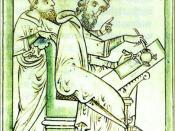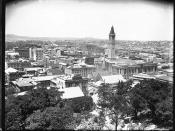Plato's Republic is mainly the discussion of justice versus injustice and the task of defining each. To figure out how to grasp a definition, Socrates, Glaucon, and Adeimantus set to creating a Just City as a model for the individual. Eventually they come to the point of seizing the land of neighbors, discovering the origins of war (373 e). With war as a factor, they must create guardians not only to fight to gain land, but also to protect the city. Socrates states that "the work of the guardians is most important, it requires most freedom from other things and greatest skill and devotion" (374 e). From this quotation, the reader realizes that the guardian class, which contains rulers and the auxiliary, will be one of the primary focuses of the Just City. To better the quality of the city, Socrates creates ideal traits for the guardians.
They must have keen senses, speed, and physical strength while being courageous and spirited (375 a-b). This spiritedness, which is known as thumos, includes desire, passion, need for revenge, obedience, longing for honor, and tends to prefer war to peace. While this combination of ingredients makes for a good warrior, it raises some problems for a regular citizen functioning within a city. According to Socrates, the guardians "must be gentle to their own people and harsh to the enemy" (375 c). This is one of the most crucial elements of discussion in Republic, the idea of how to make a class of people that is spirited yet gentle, warlike yet peaceful. Socrates attempts to moderate the thumos of the Just City's guardian class to make them an ideal group of defenders, warriors, leaders and citizens through a very specific education in poetry which includes censorship and brainwashing.
Education is...


